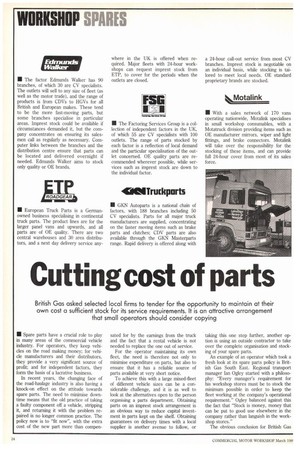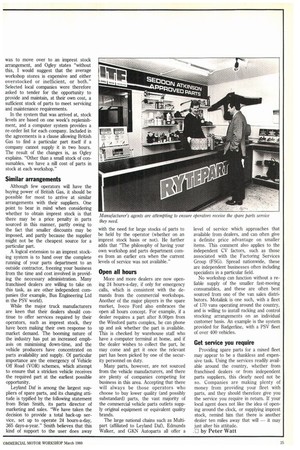Cutting cost of parts
Page 130

Page 131

If you've noticed an error in this article please click here to report it so we can fix it.
British Gas asked selected local firms to tender for the opportunity to maintain at their own cost a sufficient stock for its service requirements. It is an attractive arrangement that small operators should consider copying
• Spare parts have a crucial role to play in many areas of the commercial vehicle industry. For operators, they keep vehicles on the road making money; for vehicle manufacturers and their distributors, they provide a very significant source of profit; and for independent factors, they form the basis of a lucrative business.
In recent years, the changing face of the road-haulage industry is also having a knock-on effect on the attitude towards spare parts. The need to minimise downtime means that the old practice of taking a faulty component off a vehicle, stripping it, and returning it with the problem repaired is no longer common practice. The policy now is to "fit now", with the extra cost of the new part more than compen sated for by the earnings from the truck and the fact that a rental vehicle is not needed to replace the one out of service.
For the operator maintaining its own fleet, the need is therefore not only to minimise expenditure on parts, but also to ensure that it has a reliable source of parts available at very short notice.
To achieve this with a large mixed-fleet of different vehicle sizes can be a considerable challenge, and it is as well to look at the alternatives open to the person organising a parts department. Obtaining parts on an imprest stock arrangement is an obvious way to reduce capital investment in parts kept on the shelf. Obtaining guarantees on delivery times with a local supplier is another avenue to follow, or taking this one step further, another option is using an outside contractor to take over the complete organisation and stocking of your spare parts.
An example of an operator which took a fresh look at its spare parts policy is British Gas South East. Regional transport manager Ian Ogley started with a philosophy: "Every manager's requirement for his workshop stores must be to stock the minimum possible in order to keep the fleet working at the company's operational requirement." Ogley balanced against this the fact that "Stock is money, money that can be put to good use elsewhere in the company rather than languish in the workshop stores."
The obvious conclusion for British Gas
was to move over to an imprest stock arrangement, and Ogley states "without this, I would suggest that the average workshop stores is expensive and either overstocked or inefficient, or both." Selected local companies were therefore asked to tender for the opportunity to provide and maintain, at their own cost, a sufficient stock of parts to meet servicing and maintenance requirements.
In the system that was arrived at, stock levels are based on one week's replenishment, and a computer system provides a re-order list for each company. Included in the agreements is a clause allowing British Gas to find a particular part itself if a company cannot supply it in two hours. The result of the changes is, as Ogley explains. "Other than a small stock of consumables, we have a null cost of parts in stock at each workshop."
Similar arrangements
Although few operators will have the buying power of British Gas, it should be possible for most to arrive at similar arrangements with their suppliers. One point to bear in mind when considering whether to obtain imprest stock is that there may be a price penalty in parts sourced in this manner, partly owing to the fact that smaller discounts may be imposed, and partly because the supplier might not be the cheapest source for a particular part.
A logical extension to an imprest stocking system is to hand over the complete running of your parts department to an outside contractor, freezing your business from the time and cost involved in providing the necessary administration. Many franchised dealers are willing to take on this task, as are other independent companies (for example, Bus Engineering Ltd in the PSV world).
While the major truck manufacturers are keen that their dealers should continue to offer services required by their operators, such as imprest stock, they have been making their own response to market demand. The booming nature of the industry has put an increased emphasis on minimising down-time, and the vehicle producers have concentrated on parts availability and supply. Of particular importance are the emergency of Vehicle Off Road (VOR) schemes, which attempt to ensure that a stricken vehicle receives the required part at the earliest possible opportunity.
Leyland Daf is among the largest suppliers of spare parts, and its changing attitude is typified by the following statement from Brian Smith, its parts director of marketing and sales. "We have taken the decision to provide a total back-up service, set up to operate 24 hours-a-day, 365 days-a-year." Smith believes that this kind of support to the user does away with the need for large stocks of parts to be held by the operator (whether on an imprest stock basis or not). He further adds that "The philosophy of having your own workshop and parts department comes from an earlier era when the current levels of service was not available."
Open all hours
More and more dealers are now opening 24 hours-a-day, if only for emergency calls, which is consistent with the demands from the commercial workshops. Another of the major players in the spare market, lveco Ford also embraces the open all hours concept. For example, if a dealer requires a part after 8.00pm from the Winsford parts complex, he can phone up and ask whether the part is available. This is checked by warehouse staff who have a computer terminal at home, and if the dealer wishes to collect the part, he may come and get it once the relevant part has been picked by one of the security personnel on duty.
Many parts, however, are not sourced from the vehicle manufacturers, and there are plenty of companies competing for business in this area. Accepting that there will always be those operators who choose to buy lower quality (and possibly substandard) parts, the vast majority of the commercial vehicle parts outlets supply original equipment or equivalent quality brands.
The large national chains such as Multipart (affiliated to Leyland Daf), Edmunds Walker, and GI(N Autoparts all offer a level of service which approaches that available from dealers, and can often give a definite price advantage on smaller items. This comment also applies to the independent CV factors, such as those associated with the Factoring Services Group (FSG). Spread nationwide, these are independent businesses often including specialists in a particular field.
No workshop can function without a reliable supply of the smaller fast-moving consumables, and these are often best sourced from one of the van sales distributors. Motalink is one such, with a fleet of 170 vans operating around the country, and is willing to install racking and control stocking arrangements on an individual customer basis. An example is the system provided for Badgerline, with a PSV fleet of over 400 vehicles.
Get service you require
Providing spare parts for a mixed fleet may appear to be a thankless and expensive task. Using the services readily available around the country, whether from franchised dealers or from independent parts suppliers, this clearly need not be so. Companies are making plenty of money from providing your fleet with parts, and they should therefore give you the service you require in return. If your local agent does not like the idea of opening around the clock, or supplying imprest stock, remind him that there is another dealer ten miles away that will — it may just alter his attitude.
by Peter Watt
















































































































































